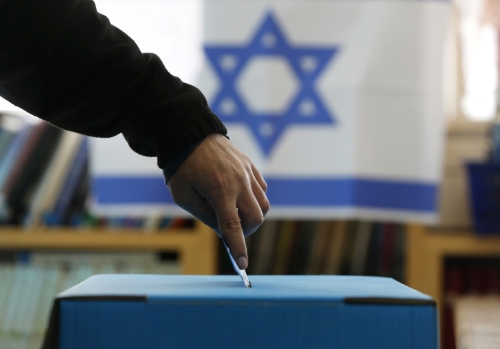Israel is Voting: The “Every Vote Counts” Cliché Turned to Reality in Israel Fourth Election

Over the past days, in the lead up to the election in Israel, we are increasingly seeing more and more strategic campaigning. I call this time the “mathematicians’ time”.
These are the days when many discussions revolve around how to vote tactically to support the block you’re in favor of. Everyone is trying to make those calculated decisions, often based on recent polls; if you vote for Gideon Saar, you may end up getting Yair Lapid as prime minister. If you decide not to vote for Bezalel Smotrich’s party, he may not pass the electoral threshold and then the right-wing block will lose the election. Many Israelis are trying to figure out who’d they need to vote for in order to ensure their block – the pro-Netanyahu block or the anti-Netanyahu block will stand a chance of forming a coalition government. On these final hours before the election, we find strategies, manipulations, lies, and deceits and very little ideology or world views. Many Israelis will go to the polls with a decision based on these tactics rather than a firm opinion on who would be the best person to run the country.
This has not led to great enthusiasm among voters. Unlike previous elections, where two candidates ran for premiership and rallied many voters in unprecedented numbers, this round is very likely to see lower turnout.
The voter turnout is likely to play a significant role in the outcome of this election. The election held in March 2020 saw a 71% turnout rate, which is considered high in Israel (since 2003, voting turnout has mostly remained in the 60’s%).
Looking at the last election’s turnout rate, the only political parties who succeeded in bringing the highest number of their voters to the polls (80% and above) are the two main religious parties – Shas and Yahadut HaTorah. A bit behind are the parties that represent the settlers’ vote, who had around 75% turnout rate. Behind them we can find cities with a majority of Likud supporters or Arab supporters whose turnout rate was around 65%. Cities with the majority of center-left supporters had 70% turnout rate.
Among the main drivers of this impressive turnout rate was the fact that Israeli Arabs headed to the polls in unprecedented numbers with an astounding 64%. According to most predictions, Israeli Arabs are less likely to vote at this election which could weaken the Arab parties – The Joint List (HaReshima HaMeshutefet) and the United Arab List (Ra’am).
Another factor that makes it hard to predict the turnout rate is the reluctance to vote because of the fears of COVID-19 transmission. We have seen a decrease in voter turnout in many countries that held elections over the past year. Yet despite a successful vaccination campaign, COVID-19 fears are still likely to effect voters. The younger generations, who are normally less inclined to vote, are even more likely to avoid the polling stations tomorrow as they are part of the population group with highest rate of people who avoided vaccinations.
Election fatigue is also likely to affect the turnout rate. According to a recent Channel 12 poll, around 10% of Israelis remain undecided, which translates into 12 seats. Some Israelis may well decide to stay home after three election ended up in a fourth one. Many Israelis know they may well head into a fifth round in a 2021.
But a counter- factor that can play a part in the result is that unlike previous years, this would be the first election almost all of voting age Israelis will remain in Israel. National Election Day is a paid Vacation Day in Israel, which has always been used by many Israelis to travel abroad. Because of COVID-19 restrictions, few have been able to depart so it would be very interesting to see if it will encourage more Israelis to cast their votes this year.
Many parties are likely to take proactive steps to encourage voters to turn up because they know how significant every vote is this time. For example, if the Likud will be able to raise the turnout rate among its supporters by “a mere” 1%, it can translate these votes into 1 mandate – which could be the one seat required to form a majority coalition government. The ability of parties to bring their voters to the polling station will play a significant role in an election which is likely to have a low turnout.
With less than 24 hours before the polling stations open, the key indicator for everyone to watch closely is the voter turnout rate– it can be the one factor that will make the difference between losing or winning this election.
Roni Rimon is a notable PR practitioner in Israel. He began his career as the legal correspondent for Israel’s daily newspaper, Haaretz. He served as a spokesperson for the City of Tel Aviv-Jaffa.
Rimon has advised nonprofits as private companies, social organizations, public figures, and senior politicians.
Among others. in 2006, he served as campaign manager for Israel’s Labor Party. In 2009, he headed Benjamin Netanyahu’s winning general election campaign.
Read more about: Elections in Israel




